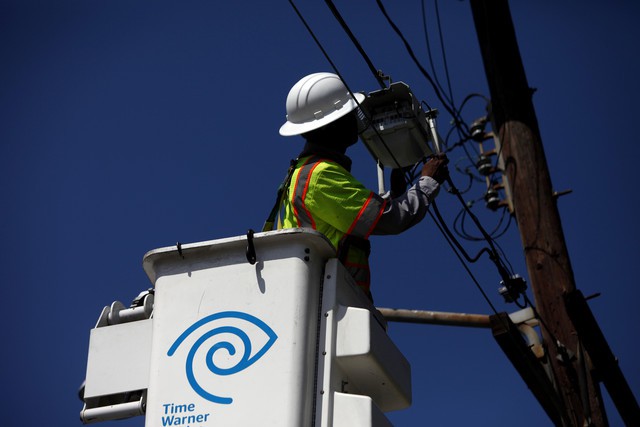 Time Warner Cable says it is forced to pay monopoly rates to rent space on North Carolina’s publicly owned utility poles and it now wants the state government to settle the issue by regulating prices to better reflect actual costs.
Time Warner Cable says it is forced to pay monopoly rates to rent space on North Carolina’s publicly owned utility poles and it now wants the state government to settle the issue by regulating prices to better reflect actual costs.
The cable company is suing five rural, member-owned electric cooperatives at the North Carolina Utilities Commission, claiming the tiny utilities are bullies that routinely stonewall, coerce, retaliate and strong-arm the country’s second largest cable company into paying up. Time Warner Cable claimed when it refused to pay one co-op’s rate demands in full, the utility threatened to add the unpaid fees to Time Warner’s electric bill and eventually cut off electricity if it went unpaid. The cable company also claims it has faced penalty fees in the millions of dollars and in one case, a threat to call the local sheriff on a cable technician repairing a line during a service outage.
The News & Observer reports the public utilities and cable operator are at an impasse. Rural utilities claim they are being undercut by a federal rate formula that many for-profit, investor-owned utilities subscribe to that requires cable companies to pay $5-7 per pole per year in rental fees. But many rural co-ops have substantially higher costs, do not generate their own electricity, have wiring and poles stretched between significantly fewer customers and don’t set rates and policies with an aim to compensate investors and shareholders.
 The five public utilities each serve between 26,800-122,000 customers. Altogether, the five maintain 75,000 utility poles now involved in the dispute. All charge considerably more for pole rentals than Duke Energy, the state’s largest for-profit utility, which gets somewhere between $5-7 a year for each pole. Co-ops South River EMC is seeking $17.40 per year. Carteret-Craven EMC wants $23.60 a year.
The five public utilities each serve between 26,800-122,000 customers. Altogether, the five maintain 75,000 utility poles now involved in the dispute. All charge considerably more for pole rentals than Duke Energy, the state’s largest for-profit utility, which gets somewhere between $5-7 a year for each pole. Co-ops South River EMC is seeking $17.40 per year. Carteret-Craven EMC wants $23.60 a year.
The National Rural Electric Cooperative Association explains the disparity in rates is the result of the higher risks co-ops face if the local cable company gets sloppy and damages the pole or creates operational or safety issues.
 “In order to maintain 501(c)(12) cooperative tax-exempt status, cooperatives charge cost-based rates for their services, including pole attachments,” claims NRECA. “Some costs are difficult to identify and quantify, especially operational or safety issues that improper pole attachments may cause. If a federal uniform rate pushed attachment rates lower than actual costs, member owners of the not-for profit electric co-op would wind up subsidizing cable, broadband and telecommunications corporations, many of which are for-profit entities.”
“In order to maintain 501(c)(12) cooperative tax-exempt status, cooperatives charge cost-based rates for their services, including pole attachments,” claims NRECA. “Some costs are difficult to identify and quantify, especially operational or safety issues that improper pole attachments may cause. If a federal uniform rate pushed attachment rates lower than actual costs, member owners of the not-for profit electric co-op would wind up subsidizing cable, broadband and telecommunications corporations, many of which are for-profit entities.”
NRECA claims the federal pole attachment rate formula that Time Warner Cable now advocates be applied across North Carolina was set artificially low to promote rural broadband expansion by enticing cable operators to wire areas they have never wired before. While that may sound good for rural consumers looking for cable broadband service, electric ratepayers could end up subsidizing the cable company’s expansion through higher electricity rates to recoup unpaid pole expenses. The electric co-op group also argues that even with artificially low pole attachment rates, that doesn’t guarantee cable companies will actually invest the savings into service expansion or lower prices for their customers.
Ironically, cable operators like Time Warner Cable that show little interest in sharing their infrastructure with others argue rural co-ops should be forced to share their poles.
“Once cable operators have constructed their aerial networks on existing pole infrastructure,” Time Warner wrote, “they are essentially captive because it would be prohibitively expensive and impractical (or impossible) to rebuild those networks underground or to install their own poles.”


 Subscribe
Subscribe
wa wa wa. How about they cry about overcharging existing users every month. 15mbps, phone, and cable shouldn’t cost even close to $150 or more . Oh yeah the $10 modem lease fee even if you still use one of their docsis 2.0 modems
Those poles are not owned by the public. They are owned by the members of the cooperative. Electric service in Mishawaka, Indiana is owned by the city of Mishawaka. They buy power from American Electric Power or NIPSCO. They own the poles, the wires, and the transformers. The people who maintain those parts are city employees. Comcast has cable on their poles. I doubt they hang it on the poles for free.